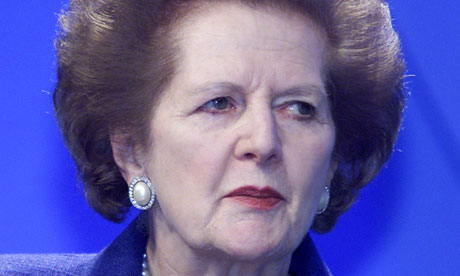News of Margaret Thatcher's death this morning instantly and predictably gave rise to righteous sermons on the evils of speaking ill of her. British Labour MP Tom Watson decreed: "I hope that people on the left of politics respect a family in grief today." Following in the footsteps of Santa Claus, Steve Hynd quickly compiled a list of all the naughty boys and girls "on the left" who dared to express criticisms of the dearly departed Prime Minister, warning that he "will continue to add to this list throughout the day." Former Tory MP Louise Mensch, with no apparent sense of irony, invoked precepts of propriety to announce: "Pygmies of the left so predictably embarrassing yourselves, know this: not a one of your leaders will ever be globally mourned like her."
This demand for respectful silence in the wake of a public figure's death is not just misguided but dangerous. That one should not speak ill of the dead is arguably appropriate when a private person dies, but it is wildly inappropriate for the death of a controversial public figure, particularly one who wielded significant influence and political power. "Respecting the grief" of Thatcher's family members is appropriate if one is friends with them or attends a wake they organize, but the protocols are fundamentally different when it comes to public discourse about the person's life and political acts. I made this argument at length last year when Christopher Hitchens died and a speak-no-ill rule about him was instantly imposed (a rule he, more than anyone, viciously violated), and I won't repeat that argument today; those interested can read my reasoning here.
But the key point is this: those who admire the deceased public figure (and their politics) aren't silent at all. They are aggressively exploiting the emotions generated by the person's death to create hagiography. Typifying these highly dubious claims about Thatcher was this (appropriately diplomatic) statement from President Obama: "The world has lost one of the great champions of freedom and liberty, and America has lost a true friend." Those gushing depictions can be quite consequential, as it was for the week-long tidal wave of unbroken reverence that was heaped on Ronald Reagan upon his death, an episode that to this day shapes how Americans view him and the political ideas he symbolized. Demanding that no criticisms be voiced to counter that hagiography is to enable false history and a propagandistic whitewashing of bad acts, distortions that become quickly ossified and then endure by virtue of no opposition and the powerful emotions created by death. When a political leader dies, it is irresponsible in the extreme to demand that only praise be permitted but not criticisms.
Click Here to Read Whole Article
|
Rate It | View Ratings |

OpEdNews depends upon can't survive without your help.
If you value this article and the work of OpEdNews, please either Donate or Purchase a premium membership.
If you've enjoyed this, sign up for our daily or weekly newsletter to get lots of great progressive content.
Most Popular Articles by this Author: (View All Most Popular Articles by this Author)
HSBC, too big to jail, is the new poster child for US two-tiered justice system
US investigates possible WikiLeaks leaker for "communicating with the enemy"
Prosecution of Anonymous activists highlights war for Internet control
4 quick points about the MSNBC discussion
The myth of Obama's "blunders" and "weakness"
The Remarkable, Unfathomable Ignorance of Debbie Wasserman Schultz
To View Comments or Join the Conversation:





